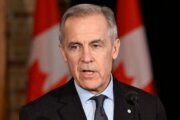JOSH LEDERMAN
Associated Press
WASHINGTON (AP) — President Barack Obama’s choice to be the next attorney general isn’t the only major decision that will have to wait until after November’s midterm elections. A host of other contentious announcements are also in a holding pattern — chief among them the Keystone XL pipeline and immigration.
With Obama’s own approval ratings sagging, the White House is wary of making any bold moves now that could become a litmus test for candidates, forcing Democrats across the country either to disagree with the president publicly or embrace him — and risk the fallout from voters. By holding off for a few more months, the White House hopes to prevent those moves from being used against Democrats in television ads and on the campaign trail.
Another key consideration: If Democrats do poorly in the elections, Obama doesn’t want to be the scapegoat. A difficult election map and historical trends mean Democrats may lose their Senate majority and see their House ranks depleted even further. White House aides are concerned that if Obama acts now, pundits will say it’s because Obama’s actions were political poison. That could imperil Obama’s prospects for getting Congress to act on his priorities during his final two years in office.
A look at some of the major decisions Obama has delayed until after Election Day:
___
ATTORNEY GENERAL
Obama’s delay in naming a nominee to replace outgoing Attorney General Eric Holder follows requests from Senate Democrats, who asked Obama to hold off so that candidates wouldn’t be asked whether they support the nominee. Holder has promised to stay on the job until his successor is confirmed.
Waiting until after Nov. 4 means that the White House will have to try to push Obama’s nominee through Senate confirmation during the brief lame duck session between the election and the end of the year. If Republicans win control of the Senate, they may demand that Obama wait until the new Senate is seated in January, which would make it even tougher for Obama to get his nominee confirmed.
___
IMMIGRATION
After pledging to take executive action around the end of summer, Obama last month moved the deadline back until the end of 2014. Obama hasn’t said exactly what steps he’ll to fix immigration laws, but his administration has been weighing steps to shield millions of immigrants from deportation — likely igniting a clash over the boundaries of Obama’s presidential authority.
Obama insists his decision isn’t political and wasn’t intended to prevent Democratic losses in the election. But he acknowledged the politics of immigration were altered by a summer surge in unaccompanied minors showing up on the U.S. border with Mexico. The White House says it doesn’t want Obama’s actions to be wrongly interpreted as contributing to potential Democratic losses this year.
___
KEYSTONE XL
Supporters of the massive pipeline project have been waiting more than half a decade for permission for it to be built. In 2011, the Obama administration launched a review of the proposed pipeline’s route, which would cross from Canada into Montana, South Dakota and Nebraska, effectively delaying the decision until after Obama’s 2012 re-election.
Then earlier this year, Obama’s administration again delayed the decision by announcing an indefinite extension of its review, citing a judge’s ruling in Nebraska that overturned a state law permitting the pipeline to travel through the state. By waiting until after the dust settles in Nebraska, Obama ensured that his administration won’t have to make the difficult call until after Election Day.
___
EMPLOYER HEALTH MANDATE
Under Obama’s health care law, most companies must offer health coverage to employees or pay a fine. That requirement was supposed to kick in this year, but the Obama administration has delayed it twice. Last year the government issued the first reprieve amid a slew of problems with the health care rollout. Then in February, the administration granted another delay — until next year for large businesses, and until 2016 for companies with 50 to 99 employees.
Ironically, although Republicans have steadfastly opposed the employer mandate and voted dozens of times to repeal it, Obama’s delay in enforcing it is now at the center of House Republicans’ lawsuit accusing Obama of exceeding his authority.
Copyright 2014 The Associated Press. All rights reserved. This material may not be published, broadcast, rewritten or redistributed.







